Dog Poop Bags: A non-negligible source of plastic pollution

Dog poop bags: A non-negligible
source of plastic pollution
It may not contribute to global warming as much as methane gas from cattle, but those ubiquitous doggie poop bags are doing their part in clogging the environment. Dog owners have the responsibility to collect dog poops, normally using dog poop bags (DPBs), and dispose them in trash bins. A study found (yes, a company called Lintbells did a study in 2019 involving 2,000 British adults about their exercise habits with their dogs) that a dog owner uses an average of 936 DPBs annually.
In my own experience with two Golden Retrievers who eat a higher-end diet, Evie and Poppy average 2-3 poops a day each, so at the high number, that would be nearly 2,200 DPBs a year (not including a higher count at Thanksgiving and Christmas). I use both the basic blue ones and a brand that claims it is compostable and biodegradable. I will say, in my back yard, I can collect more than one poop per bag, while on a walk, it is a rare occasion when I get a DPD (double poop deployment) with both dogs circling for due north at the same time, allowing for a double scoop in a single bag.
So researchers Lei Mai and Eddy Zeng from the Center for Environmental Microplastics Studies at Jinan University in Guangzhou, China, and Elaine Zeng from University High School in Irvine, California, collaborated for the general science survey study Dog poop bags: A non-negligible source of plastic pollution. The study was financially supported by the National Natural Science Foundation of China and published in the January 2022 issue of Environmental Pollution.
As the abstract states: “Plastic pollution derived from the disposal of plastic bags in the environment is clearly evidenced. However, little attention has been directed towards plastic waste derived from plastic dog poop bags (DPBs), which are widely used and can never be recycled. Combining the weight of each DPB, the number of bags daily used for a dog, and the number of pet dogs around the world, we estimated the number of annual consumed and disposed DPBs at more than 415 billion, or equivalently 0.76–1.23 million tons of plastics based on various weights of different DPBs. Although plastic waste produced by DPBs only accounts for a small fraction (0.6%) of the total plastic waste generation, the extremely short life cycle of DPBs has made them a non-negligible source of plastic pollution in the environment.”
Concerns have been raised about single-use plastic bags and how they are disposed, and there is nothing more single-use than DPBs. Most are made of polyethylene, which is not a biomaterial, although a few DPBs brands tout they meet the requirements for easy biodegradation or composability. DPBs are generally discarded in the trash and end up in landfills or incinerators. The study concentrated on the two most popular DPBs used in the United States, which were collected in various DPB stations in the City of Irvine, California, in January 2020. The chemical composition of both DPBs was confirmed as polyethylene, one of the polymer types for plastic wastes in the environment.
Annual consumption of DPBs varies with different continents: North America, Africa, Europe, South America, and Oceania. In Asia, more than 163 billion DPBs (equivalent to 0.28–0.45 million tons of plastics) are consumed annually. The number of annual DPBs consumed in North America is approximately 82 billion (0.14–0.23 million tons). The Oceania countries consume the least amount. The study concluded the usage of DPBs should also maintain an upward trend unless alternative materials are used to replace plastics for producing DPBs and/or the current consumption pattern is disrupted.
One such alternative is using paper bags, which degrade faster than plastic bags, but unless they have some waterproofing capabilities… eww. Paper DPBs also are more expensive, which may negate its environmental benefits to consumers. The study also suggests collecting more poops per bag (PPB), which might work for small dogs compared to the larger breeds. And rather than dump the, well, dumps in the trash, perhaps scatter the contents in the environment. I guess some of my neighbors are already ahead of the game based on the deposits left in front of my house. – The editor